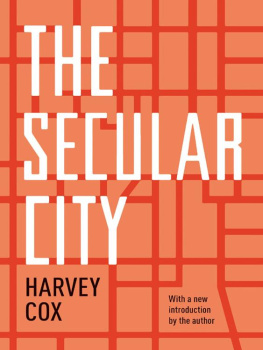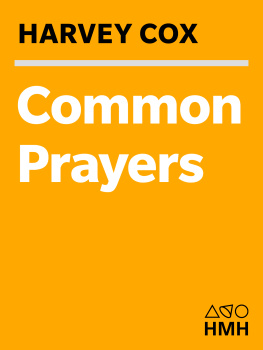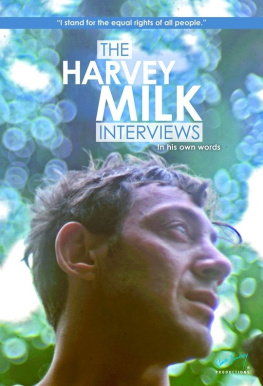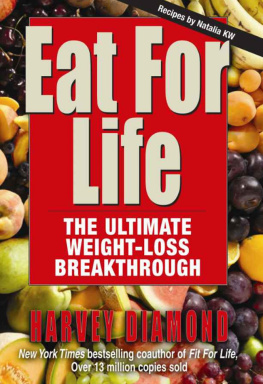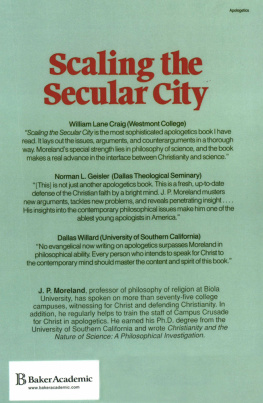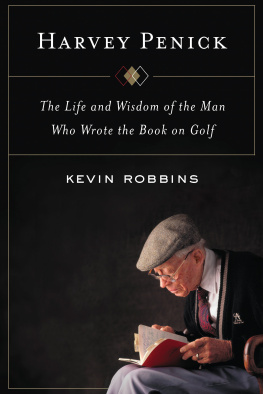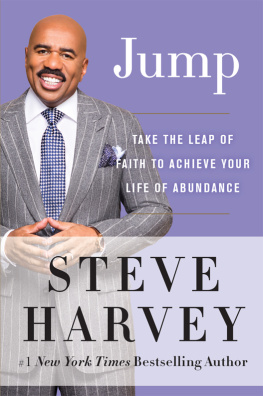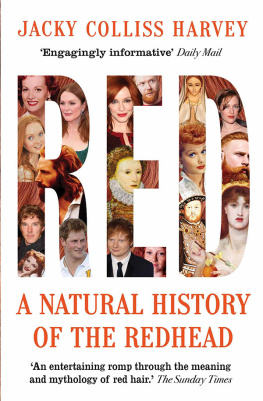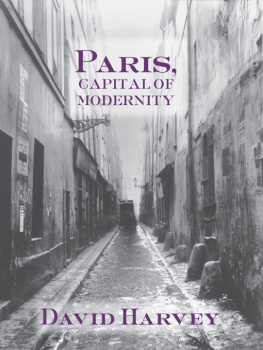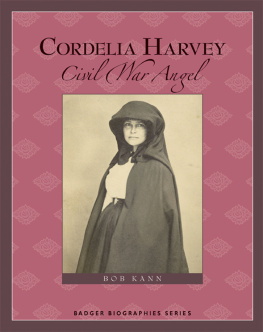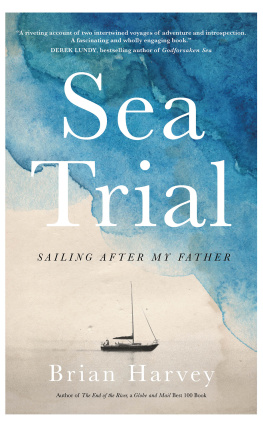Harvey Cox - The Secular City
Here you can read online Harvey Cox - The Secular City full text of the book (entire story) in english for free. Download pdf and epub, get meaning, cover and reviews about this ebook. year: 2013, publisher: Princeton University Press, genre: Religion. Description of the work, (preface) as well as reviews are available. Best literature library LitArk.com created for fans of good reading and offers a wide selection of genres:
Romance novel
Science fiction
Adventure
Detective
Science
History
Home and family
Prose
Art
Politics
Computer
Non-fiction
Religion
Business
Children
Humor
Choose a favorite category and find really read worthwhile books. Enjoy immersion in the world of imagination, feel the emotions of the characters or learn something new for yourself, make an fascinating discovery.
- Book:The Secular City
- Author:
- Publisher:Princeton University Press
- Genre:
- Year:2013
- Rating:4 / 5
- Favourites:Add to favourites
- Your mark:
- 80
- 1
- 2
- 3
- 4
- 5
The Secular City: summary, description and annotation
We offer to read an annotation, description, summary or preface (depends on what the author of the book "The Secular City" wrote himself). If you haven't found the necessary information about the book — write in the comments, we will try to find it.
Harvey Cox: author's other books
Who wrote The Secular City? Find out the surname, the name of the author of the book and a list of all author's works by series.
The Secular City — read online for free the complete book (whole text) full work
Below is the text of the book, divided by pages. System saving the place of the last page read, allows you to conveniently read the book "The Secular City" online for free, without having to search again every time where you left off. Put a bookmark, and you can go to the page where you finished reading at any time.
Font size:
Interval:
Bookmark:
THE SECULAR CITY
THE SECULAR CITY
Secularization and Urbanization in Theological Perspective
HARVEY COX
With a New Introduction by the Author
PRINCETON UNIVERSITY PRESS  PRINCETON AND OXFORD
PRINCETON AND OXFORD
Copyright 2013 by Harvey Cox.
Requests for permission to reproduce material from this work should be sent to Permissions, Princeton University Press
Published by Princeton University Press, 41 William Street, Princeton, New Jersey 08540
In the United Kingdom: Princeton University Press, 6 Oxford Street, Woodstock, Oxfordshire OX20 1TW
press.princeton.edu
The author wishes to thank the editors of The Commonweal and of Christianity and Crisis for permission to use material already published in those magazines, and to the Association Press for permission to use material that first appeared in their series of pamphlets Revolution and Response.
All Rights Reserved
Library of Congress Cataloging-in-Publication Data
Cox, Harvey Gallagher.
The secular city : secularization and urbanization in theological perspective / Harvey Cox ; with a new introduction by the author.
pages cm
Includes bibliographical references and index.
ISBN 978-0-691-15885-3 (pbk. : alk. paper) 1. Church and the world. 2. Secularization (Theology) 3. City churches. 4. Cities and townsUnited States. 5. Sociology, Urban. I. Title.
BR115.W6C65 2013
261dc23 2013008390
British Library Cataloging-in-Publication Data is available
This book has been composed in Janson
Printed on acid-free paper.
Printed in the United States of America
10 9 8 7 6 5 4 3 2 1
To Nina
CONTENTS
Albert Camus and Profanity 84
10 The Church and the Secular University 257
INTRODUCTION TO THE NEW EDITION
Every aspiring author hopes that thousands of people will read the book he writes, but secretly wonders if anyone will. When the Macmillan Company published The Secular City in 1965, after several other publishers had turned it down, I was no exception. So imagine my happy surprise when it quickly went into multiple printings, became an international best seller, was translated into fourteen languages, and eventually reached nearly a million readers. Journals devoted entire issues to it, and I received invitations to exotic places to defend it, debate its critics (there were many), or elaborate on it. In 1990 a twenty-fifth anniversary edition was published. Now, after nearly half a century, the book, or parts of it, is still being translated, most recently into Chinese and Bulgarian. And here we have this forty-eighth anniversary edition. It all still seems quite amazing.
In retrospect the books chances did not look that promising. I wrote it after I returned from a year of intensive study and teaching in Berlin, and my writing bristled with references to scholars like Friedrich Gogarten, Alfons Auer, and Gerhard Ebeling, whom most people had never heard of. In a still very religious America, I drew heavily on Dietrich Bonhoeffers ideas about how we need a nonreligious interpretation of the Gospel in order to speak in a secular fashion of God. I maintained that there were many positive features about secularization, and that its key components were derived from the biblical faith. All in all it seemed like a somewhat unlikely, even quixotic enterprise. Why then did the book gain so much attention?
I think the answer is threefold: the appeal of the basic theme of the book, the minor hullabaloo it stirred up, and lucky timing. First, the theme: My premise was that we meet God not just in religion or in church history, but in all of life, including its political and cultural aspects. I harked back to the ancient Israelites, who did not encounter God in myths or nature but in the events of history, including their defeats. Therefore, my original title had been God in the Secular City, but my editor shook his head. It would sell better, he advised, simply as The Secular City. I had my doubts, but I reluctantly agreed. It was my first book, and I was hopeful that someoneanyonewould want to read it. The editor was probably right, but the shortened American title, without the word God, prompted some critics to mistakenly relegate me to the group of so-called death of God theologians of the 1960s, although in my last chapter I forcefully differed with them. Then there was the controversy it kicked up. The book kindled a vociferous debate, and as every literary agent knows, controversy sells. Some liberal critics said I was too narrowly biblical. Conservatives thought I attached too much significance to the world instead of to the church. It should be added that as an original paperback, the book cost only $1.45, so teachers felt free to assign it to college and seminary classes. Even when it did not make the official bibliography, students still read it. Years later, people who were studying at evangelical institutions told me it was a kind of underground sensation. The fact that I related religion to the Miss America Pageant, Playboy magazine, and campus sex undoubtedly contributed to its allure.
My timing was also lucky. The book came out just as the Second Vatican Council concluded in 1965, and Roman Catholics, awakened by the turn of events in Rome, bought lots of copies. Nuns, always at the forefront, or even ahead of, Catholic theology, took to it with special enthusiasm. Daniel Callahan published a collection of critical reviews entitled The Secular City Debate. When I met Pope Paul VI at the Vatican in 1967, he shook my hand warmly and told me that he had been reading it, and that although he did not agree with everything, nonetheless he had read it with great interest.
Now, nearly half a century later, opening this offspring of my youthful enthusiasm again has often made me smile but also raised my eyebrows more than once. Like everyone else, I have grown more cautious as Ive aged, but back then I wasnt cautious at all, so I blinked at the books ambitious sweep and ingenuous brashness. But I can also see that I was undoubtedly too swayed by the reigning academic consensus of the time, that religion was in decline, and that this falling off would inevitably continue as nation after nation advanced into the modern era.
Today it is obvious that such a downturn has not taken place, and this sharp reversal of fortune for the scholarly soothsayers does affect some of the details of The Secular City. But it does not undercut its basic thesis. My interest was not primarily historical or sociological. It was theological. The core question I asked, suggested by my original intended title, still holds: How is the biblical God, who acts in history, and not just in the church, present in our history today?
The heart of the book is an analysis of the dynamic interplay between the religious and the secular, and questions about this tortuous relationship are even more pressing today. It is worth noting that after the brief, heated flurry that arose about The Secular City, the hubbub subsided for a while. But in more recent years a fresh torrent of books and articles devoted to such themes as the postsecular society, after secularization, and even the death of the death of God has flooded academic and church circles.
Why this second coming? Why has the debate The Secular City helped to ignite leaped into life again? The reasons are not hard to discern. Europeans and Americans differ from each other about the secular and the appropriate relationship between religion, culture, and politics. But both are discovering that their assumptions about the role of religion in modern society places them in a distinct minority in a world that is also becoming modern, but that remains persistently religious. In turn, this recognition resuscitated an even more fundamental question about what we
Next pageFont size:
Interval:
Bookmark:
Similar books «The Secular City»
Look at similar books to The Secular City. We have selected literature similar in name and meaning in the hope of providing readers with more options to find new, interesting, not yet read works.
Discussion, reviews of the book The Secular City and just readers' own opinions. Leave your comments, write what you think about the work, its meaning or the main characters. Specify what exactly you liked and what you didn't like, and why you think so.

